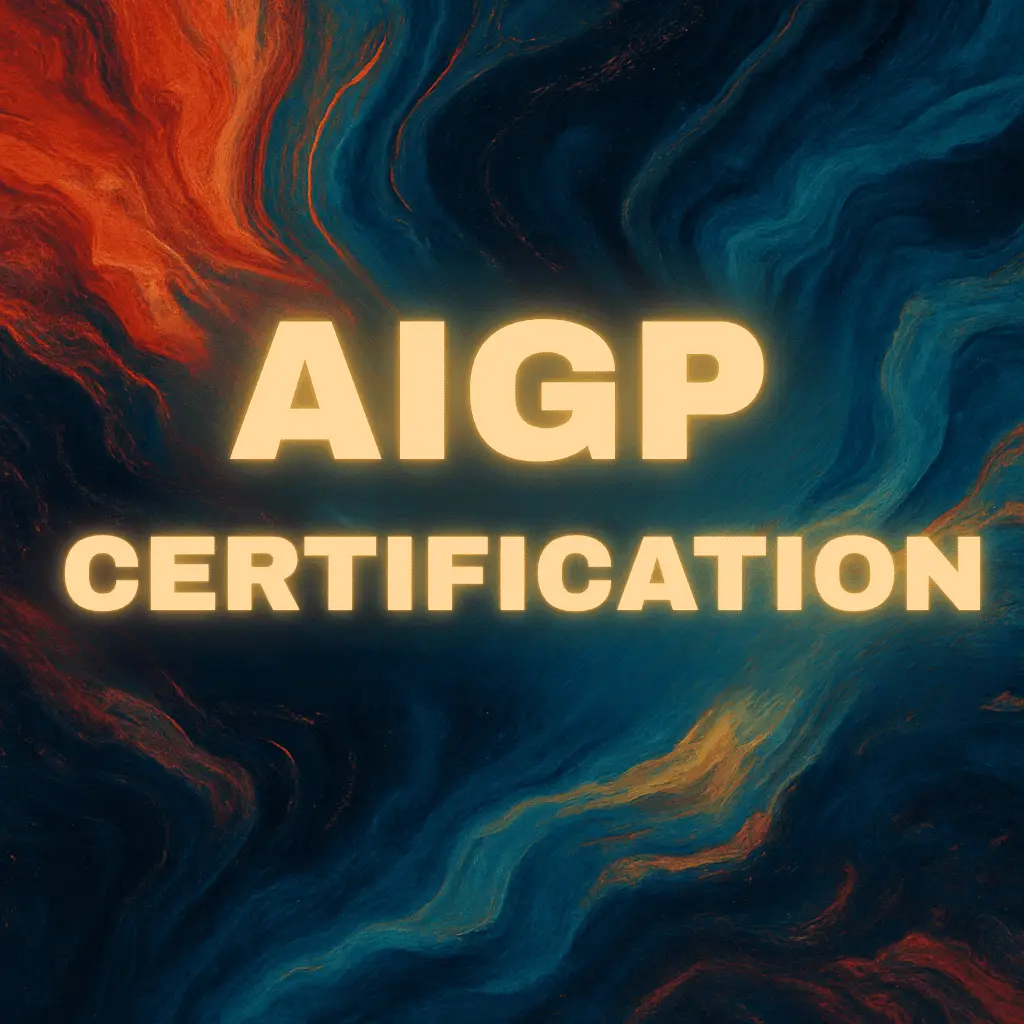Authored by Derrick Jackson & Co-Author Lisa Yu | Last updated 08/17/2025
Table of Contents
Hello Everyone, Help us grow our community by sharing and/or supporting us on other platforms. This allow us to show verification that what we are doing is valued. It also allows us to plan and allocate resources to improve what we are doing, as we then know others are interested/supportive.
Pressed for Time?
Review or Download our 2-3 min Quick Slides or the 5-7 min Article Insights to gain knowledge with the time you have!
Review or Download our 2-3 min Quick Slides or the 5-7 min Article Insights to gain knowledge with the time you have!
AIGP Certification Overview
Most AI compliance roles don’t require coding experience. Surprising, right?
The reality challenges common assumptions about AI careers. While organizations deploy artificial intelligence systems at unprecedented speed, they desperately need professionals who can ensure these systems operate safely, legally, and ethically. These aren’t the people building neural networks. They’re the professionals governing them.
Consider the numbers. Over 4,000 people signed up for AIGP training before the certification even launched in March 2024.¹ That level of pre-launch interest signals massive market demand for AI governance expertise.
The International Association of Privacy Professionals (IAPP) created the Artificial Intelligence Governance Professional (AIGP) certification to address this skills gap.² The same organization behind well-established privacy certifications like CIPP and CIPM recognized that AI governance represents a distinct professional discipline requiring specialized knowledge.
This isn’t about technical implementation. It’s about risk management, regulatory compliance, and ethical oversight. The global average total compensation for AI governance professionals reaches $200,000, with specialists in AI governance legal and compliance roles averaging $190,000.³
The timing couldn’t be better. Global AI regulations like the EU AI Act are moving from proposal to enforcement. Organizations face legal obligations requiring qualified professionals who can design, implement, and manage auditable governance frameworks. The AIGP certification provides that qualification.
What’s the Deal with AIGP Certification?
The Artificial Intelligence Governance Professional (AIGP) certification represents the first globally recognized, vendor-neutral credential specifically designed for AI governance.³ It’s issued by the IAPP, a globally recognized, policy-neutral, not-for-profit association founded in 2000.⁴
The IAPP has firmly established itself as the leading authority in privacy and data protection, offering premier professional certifications including the Certified Information Privacy Professional (CIPP), Certified Information Privacy Manager (CIPM), and Certified Information Privacy Technologist (CIPT). These credentials are accredited by the American National Standards Institute (ANSI) National Accreditation Board (ANAB) under the rigorous ISO/IEC 17024:2012 standard, signifying a global benchmark for professional competence.²
The AIGP’s development was a direct response to exponential AI growth and urgent demand from businesses and society for qualified professionals capable of managing complex AI risks. Spearheaded by the IAPP’s AI Governance Center, launched in 2023, the program was created to professionalize the emerging field of AI governance.⁵

The certification serves as a verifiable standard, demonstrating that an individual possesses necessary knowledge and skills to ensure safety, trust, and ethical considerations are embedded in AI development, deployment, and ongoing management. It validates a professional’s capacity to establish and maintain trustworthy AI governance frameworks in rapidly evolving technological and regulatory landscapes.
What makes AIGP different from other AI certifications is its focus on governance rather than technical implementation. You won’t learn to build AI systems. You’ll learn to oversee them responsibly, understanding risks, ensuring compliance, and managing ethical challenges that arise when AI affects real people and business operations.
The certification has already gained significant traction across industries. The official training curriculum was released on October 2, 2023, followed by exam availability on April 2, 2024. The inaugural in-person exams were administered at the IAPP Global Privacy Summit on April 4, 2024, marking the official launch.¹
Who Should Look Into This?
The AIGP certification targets a surprisingly broad professional audience, reflecting the cross-functional nature of AI governance work.

Privacy and compliance professionals represent the most natural fit. If you hold certifications like CIPP or CIPM, the AIGP builds naturally on your existing foundation. There’s significant overlap between privacy concerns and AI governance principles. Data protection laws like GDPR directly impact how AI systems collect, process, and utilize training data. Purpose limitation and data minimization principles from privacy law apply directly to AI development and deployment decisions.
Legal professionals, particularly those working in technology, regulatory, or corporate law, find immediate value in AIGP training. The EU AI Act alone creates comprehensive compliance obligations requiring specialized knowledge. Corporate lawyers increasingly need to advise on AI procurement contracts, liability allocation for AI-driven decisions, and regulatory compliance strategies. The certification provides technical vocabulary and framework knowledge necessary for these complex legal discussions.
Risk management professionals discover that AI introduces unique risks traditional frameworks don’t adequately address. Model drift, adversarial attacks, bias amplification, and algorithmic accountability create new categories of organizational risk. The NIST AI Risk Management Framework, which is central to AIGP curriculum, provides structured approaches for identifying, assessing, and mitigating these novel risks.
AI project managers and technology professionals working on AI implementations benefit significantly from governance expertise. While you might not write algorithms, you need to understand compliance requirements, approval processes, and documentation standards. The certification helps you ask the right questions about bias testing, model validation, and deployment safeguards before systems go live.
Compliance officers across industries should consider this certification seriously. Healthcare organizations using AI diagnostics must ensure HIPAA compliance. Financial institutions running algorithmic trading systems face regulatory scrutiny. Manufacturing companies deploying predictive maintenance AI need to manage safety risks. AI governance knowledge applies across virtually every sector as organizations integrate these technologies into core business processes.
New graduates entering the job market shouldn’t overlook this opportunity. AI governance is a brand-new field where nobody expects decades of experience yet. The certification can serve as a powerful differentiator when competing for entry-level positions in compliance, risk management, or legal departments at organizations deploying AI systems.

The certification is explicitly designed for a broad, cross-functional audience of professionals tasked with developing, implementing, or overseeing AI governance and risk management within their organizations. The IAPP identifies ideal candidates as anyone working in AI Compliance, Risk Management, Legal, and Governance roles; Data Scientists and Model Operations (MLOps) Teams; AI Project Managers; and Social Scientists and Trust Professionals.³
The Four Knowledge Domains: What You Need to Know
The AIGP certification underwent significant curriculum revision in early 2025, streamlining from seven domains to four practical areas that reflect the field’s maturation from theoretical discussions to operational implementation.
Domain I: Understanding the Foundations of AI Governance (16-20 questions)
This domain establishes the “why and who” of AI governance, focusing on principles, policies, and organizational structures needed for robust governance programs. Key competencies include identifying unique characteristics of AI that necessitate governance (such as opacity, autonomy, and scale), defining and applying common principles of responsible AI (fairness, safety, transparency, accountability), and establishing cross-functional roles and responsibilities for AI oversight.
You’ll need to understand what makes AI different from traditional software systems, grasp organizational implications of AI deployment, and design governance structures that can effectively oversee AI throughout its lifecycle. This isn’t about memorizing definitions but applying governance principles to complex organizational scenarios.

Domain II: Understanding How Laws, Standards, and Frameworks Apply to AI (19-23 questions)
This domain covers the complex and rapidly evolving regulatory landscape. A clear “Framework Trinity” has emerged as the core curriculum: the EU AI Act, the NIST AI Risk Management Framework (RMF), and the ISO/IEC 42001 standard. These represent legislative, risk management, and organizational management system pillars of modern AI governance.
You must understand how established data protection laws, most notably GDPR, apply to AI systems. This includes key principles like purpose limitation and data minimization, plus implications of specific articles related to automated decision-making (Art. 22) and data protection impact assessments (Art. 35). The EU AI Act is the centerpiece, requiring mastery of its risk-based classification framework (prohibited, high-risk, limited-risk, minimal-risk) and distinct obligations for providers and deployers of high-risk systems.
The NIST AI RMF requires understanding of its core functions: Govern, Map, Measure, Manage. Familiarity with OECD AI Principles and ISO/IEC 42001 standard for AI management systems is also essential.

Domain III: Understanding How to Govern AI Development (21-25 questions)
This domain addresses the “how” of building AI responsibly, focusing on governance oversight of the entire development lifecycle. You’re not learning to be a developer but to effectively govern the development process. Key competencies include performing or reviewing impact assessments, ensuring data used for training is lawfully sourced and fit for purpose, overseeing testing and validation for bias and security, and ensuring comprehensive documentation (like model cards) is created before release.
This domain emphasizes practical application of governance principles during the creation process. You’ll need to understand data governance principles, model validation approaches, and documentation requirements that enable ongoing oversight of AI systems.
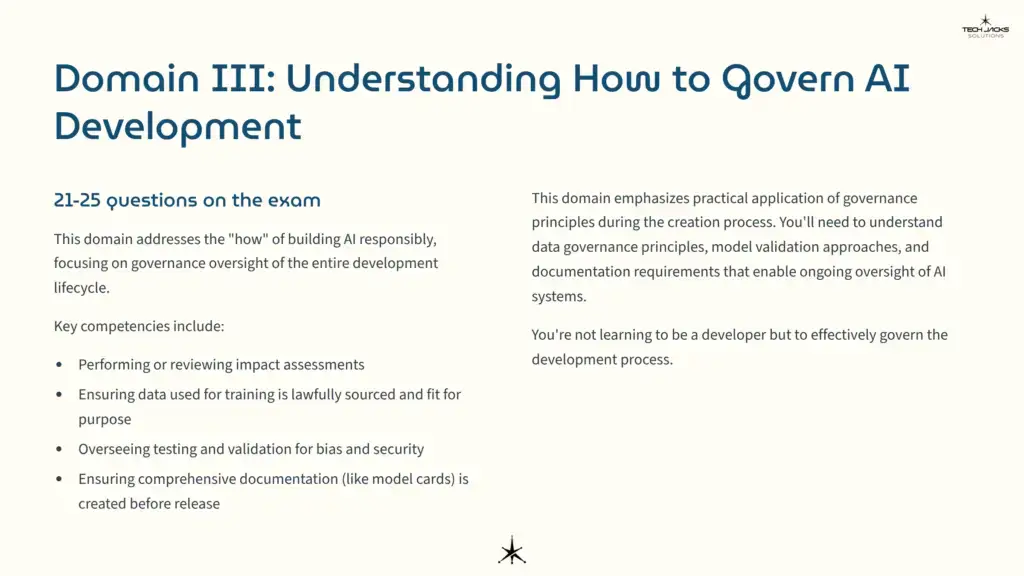
Domain IV: Understanding How to Govern AI Deployment and Use (21-25 questions)
The final domain covers post-deployment governance activities, focusing on operational management after models move into production. Key competencies include evaluating risks of deploying specific models (whether built in-house or procured from third-party vendors), implementing continuous post-deployment monitoring to detect issues like model drift or performance degradation, establishing incident response plans, and creating policies for deactivating models when necessary.
The weighting of domains III and IV is particularly revealing, together accounting for 42 to 50 of the 85 scored questions. This means approximately 50-60% of the entire exam is dedicated to applying governance principles in operational contexts, requiring candidates to move beyond memorization and develop ability to apply knowledge to complex, real-world scenarios.⁶

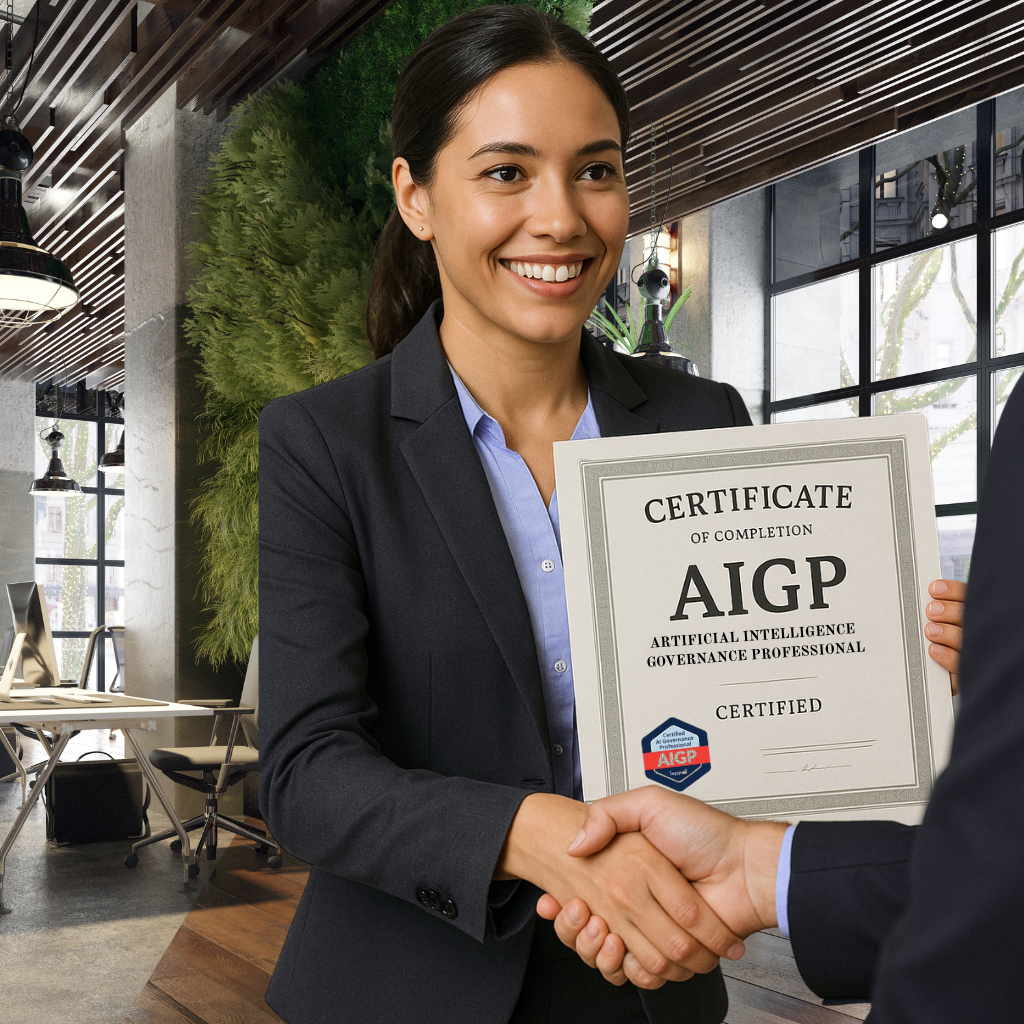
What to Expect From the Exam
The AIGP exam consists of 100 multiple-choice questions with a 2.75-hour (165 minutes) time limit. Of these questions, 85 are scored while 15 are unscored pre-test items used for statistical analysis and future exam development.³
The passing standard uses a scaled score system requiring 300 or higher on a scale from 100 to 500. This cut score is determined through formal psychometric analysis by subject matter experts to represent the competence level required of a professional in the field.³
A significant feature distinguishes this exam: approximately 30% of questions are scenario-based, linked to case studies presenting real-world AI governance challenges. These require candidates to apply knowledge rather than simply recall facts.⁷

Testing Format and Administration
The exam is administered globally by Pearson VUE. Candidates can take the exam either in-person at designated Pearson VUE testing centers or remotely through the OnVue online proctoring platform.³ The registration process involves creating an account on the IAPP website, purchasing an exam voucher, and scheduling through Pearson VUE.
The exam includes an optional 15-minute break, though the clock doesn’t stop during this break. If you choose online testing, you receive results instantly upon completion.
Cost Structure
The financial investment includes an initial exam fee of $649 for IAPP members and $799 for non-members. In the event of an unsuccessful attempt, the retake fee is $475 for members and $625 for non-members. This discounted rate also extends to individuals who already hold another IAPP certification.⁸
IAPP Professional Membership costs $295 annually and provides the $150 exam discount, making the effective first-year cost $145 for members versus $799 for non-members.⁹ The membership decision creates clear financial incentives, particularly for those planning multiple IAPP certifications.s or new opportunities you hadn’t considered. For many, it’s an investment that pays off quickly.
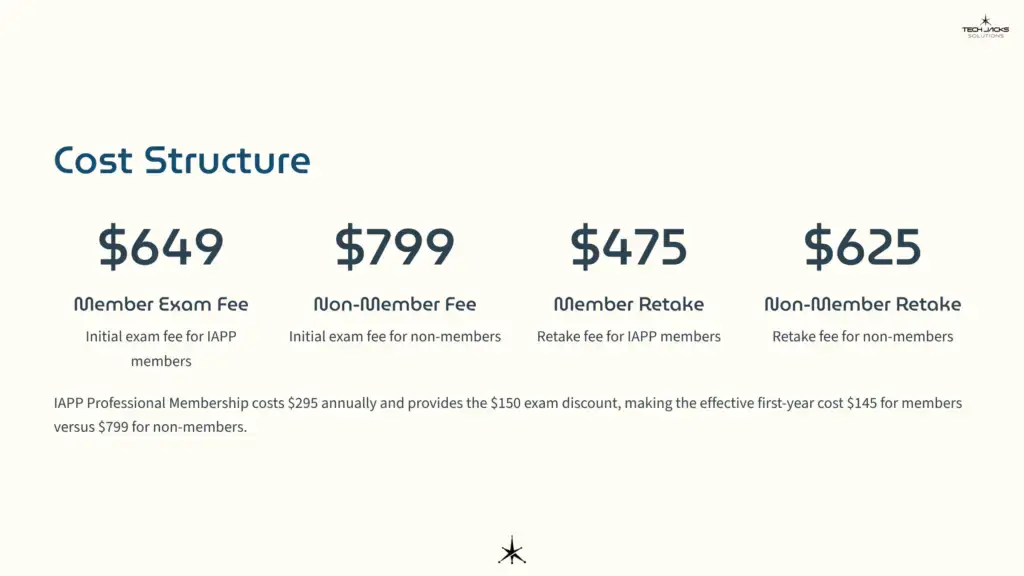
Career Impact and Salary Expectations
The AIGP certification delivers measurable career returns through direct salary premiums, enhanced mobility, and increased job security in a rapidly growing field.
Comprehensive Salary Analysis
The IAPP Salary and Jobs Report 2025-26, based on over 1,600 professionals, provides authoritative compensation benchmarks. The global average for total compensation across interconnected privacy, AI governance, and cybersecurity roles reaches $200,000. For professionals specializing in AI governance legal and compliance roles, the average base salary is $190,000.³
More granular analysis reveals significant premiums for cross-disciplinary expertise. Professionals whose roles encompass both privacy and AI governance report a higher median salary of $169,700 compared to $151,800 for those focused solely on AI governance. This nearly $18,000 median salary premium indicates that employers place high value on professionals who can bridge these critical domains.³
The highest compensation is found within the technology sector, where median salaries for technical AI governance roles reach $221,000.³ This reflects both the sector’s AI maturity and the critical nature of governance oversight in organizations deploying AI at scale.
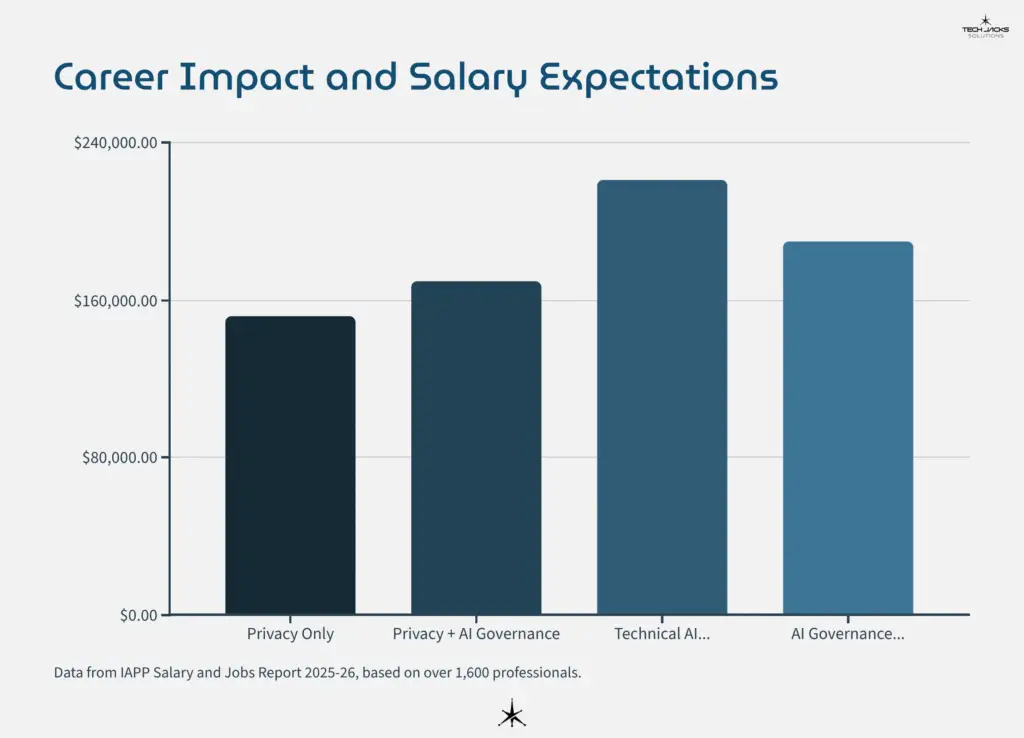
Job Market Demand and Growth
ZipRecruiter’s analysis of “AI Governance” job postings shows an average annual salary of $141,139, with tight concentration between $140,000 and $167,500. Specific job listings mentioning AIGP certification reveal consistently high salary ranges: Compliance Manager ($80,000-$120,000), Privacy Counsel ($165,000-$195,000), and Senior Counsel, Digital ($155,000-$211,000).¹⁰
Certification Premium Impact
The salary premium associated with IAPP certifications is well-documented. The organization’s 2023 survey found that holding a single IAPP certification correlated with 13% higher salaries compared to non-certified peers, rising to 27% for those holding multiple certifications.³ Recent 2025 survey data suggests similar uplifts of 10-15% for one certification and 20-30% for multiple credentials.
This is compounded by the premium associated with AI skills in general. PwC’s 2025 Global AI Jobs Barometer found that jobs requiring AI skills command a remarkable 56% wage premium, a figure that more than doubled from 25% in the previous year.¹¹

Emerging Job Categories
The market is seeing rapid emergence of new, highly specialized roles directly applicable to AIGP holders: AI Ethics Officer, AI Risk Manager, and AI Policy Analyst. Common job titles that list AIGP as relevant include Privacy Counsel/Senior Counsel Digital, Compliance Manager/Director Privacy Compliance, AI Privacy and Governance Director/Officer, Program Manager Data Protection & Privacy, and Principal Cybersecurity Analyst for Privacy and Third Party Risk Management.
Demand spans multiple sectors: technology companies (TikTok, Atlassian), financial services and insurance (major institutions building AI governance capabilities), pharmaceuticals and healthcare (AI in diagnostics and research), consulting and professional services (Accenture, Deloitte), and hospitality and consumer goods (Marriott creating AI privacy roles).
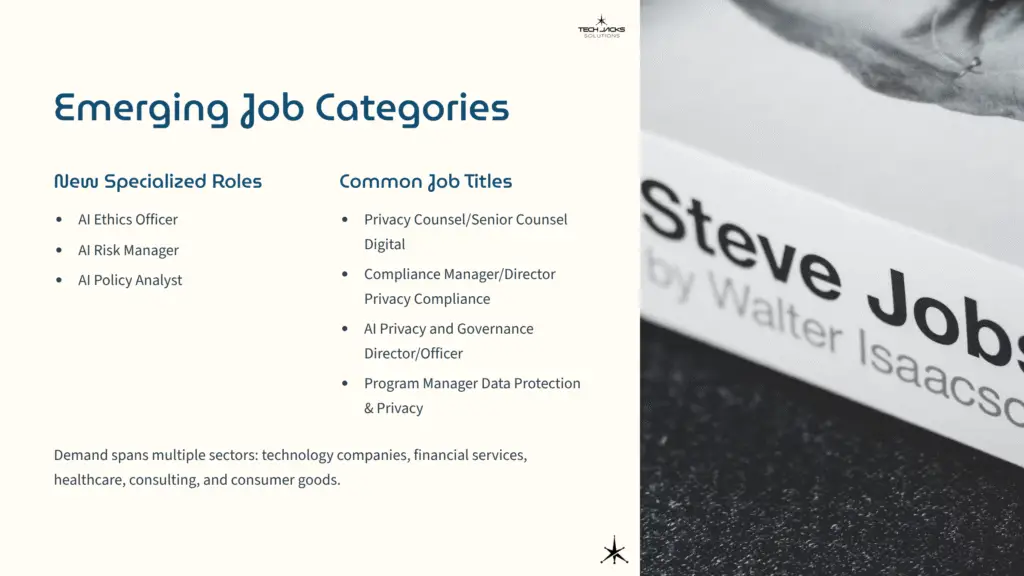
Prerequisites and Experience Requirements
One defining characteristic of the AIGP certification is its accessibility. There are no formal prerequisites such as specific academic degrees or minimum years of professional experience required to sit for the exam.³ This open-door policy makes the certification attainable for professionals from diverse backgrounds.
However, the lack of formal prerequisites shouldn’t be mistaken for lack of rigor. The exam’s content is complex and interdisciplinary, and foundational understanding of key areas is highly recommended for success. This includes baseline familiarity with fundamental AI concepts, core data privacy and protection principles, and basics of governance and risk management frameworks.⁷
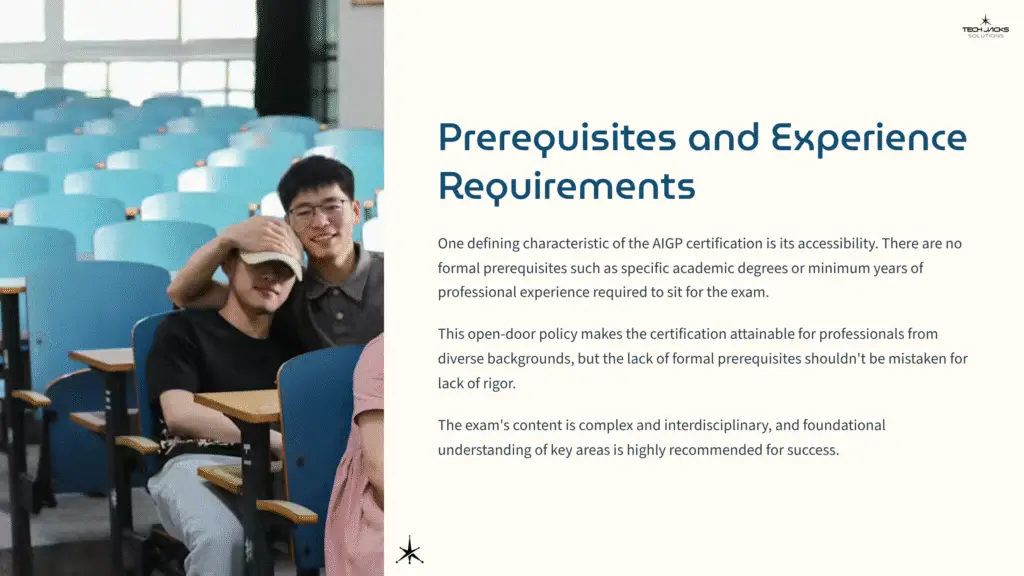
Strategic Accessibility Design
This structure appears deliberate. By removing formal barriers to entry, the IAPP has broadened the potential candidate pool to include professionals from legal, compliance, technology, and business operations who are increasingly tasked with AI oversight. The difficulty of the exam ensures that only those who can demonstrate true mastery of complex subject matter earn the credential.
This approach positions the AIGP as a credential based on demonstrated competence rather than tenure, enhancing its value for both career-changers and established professionals seeking to specialize. The certification explicitly targets a broad, cross-functional audience tasked with developing, implementing, or overseeing AI governance and risk management within organizations.
Background Recommendations
While no formal prerequisites exist, successful candidates typically benefit from experience or knowledge in areas such as legal or compliance work (understanding regulatory frameworks and risk assessment), technology or data management (grasping how AI systems function and data flows), business operations or project management (knowing organizational structures and process implementation), or privacy and data protection (familiarity with established frameworks like GDPR).
The certification’s competence-based approach makes it accessible to professionals at different career stages while maintaining rigor through challenging assessment standards.

Preparation Strategy: How to Actually Pass
The AIGP exam’s widely reported difficulty requires a strategic, multi-resource approach that extends beyond official IAPP materials alone.
Official IAPP Foundation Resources
The IAPP provides essential foundational materials including the AIGP Body of Knowledge (BoK) and Exam Blueprint, available for free. The BoK provides the definitive outline of all testable topics, while the Blueprint details question distribution across domains. Together, they provide the architectural framework for structuring study efforts.³
The IAPP AIGP Online Training consists of video-based modules designed to cover the BoK and is considered equivalent to a 13-hour live training session. The cost is $995 for IAPP members and $1,195 for non-members.¹²
The AIGP Practice Exam Digital provides a 100-question practice exam in PDF format with answer key and detailed explanations, designed to mimic actual exam content and style. The cost is $50 for members and $60 for non-members.¹³

Third-Party Resources and Study Gaps
Strong community consensus indicates that supplementing official IAPP materials with third-party resources is crucial for success. The official materials are often described as necessary but not sufficient, with community estimates suggesting they cover only 60-80% of what’s needed to pass the exam. This creates a “study gap” that successful candidates must actively bridge.
Several third-party courses have gained strong reputations for effectiveness. Online training platforms offer comprehensive preparation specifically aligned with the updated 2025 four-domain structure, including study guides, eLearning modules, flashcards, and multiple practice tests.
Proven Study Methodologies
Successful candidates consistently report several key approaches. Master the vocabulary first—the exam is heavily focused on terminology, making precise understanding of terms from the IAPP’s “Key Terms for AI Governance” glossary fundamental.¹⁴
Go directly to source documents rather than relying on summaries. This is essential for core frameworks, particularly the NIST AI RMF, the complete EU AI Act text, and OECD AI Principles. Adopt a “governance-first” and “risk-first” perspective throughout preparation, consistently analyzing scenarios from the standpoint of an AI governance professional responsible for the entire lifecycle.
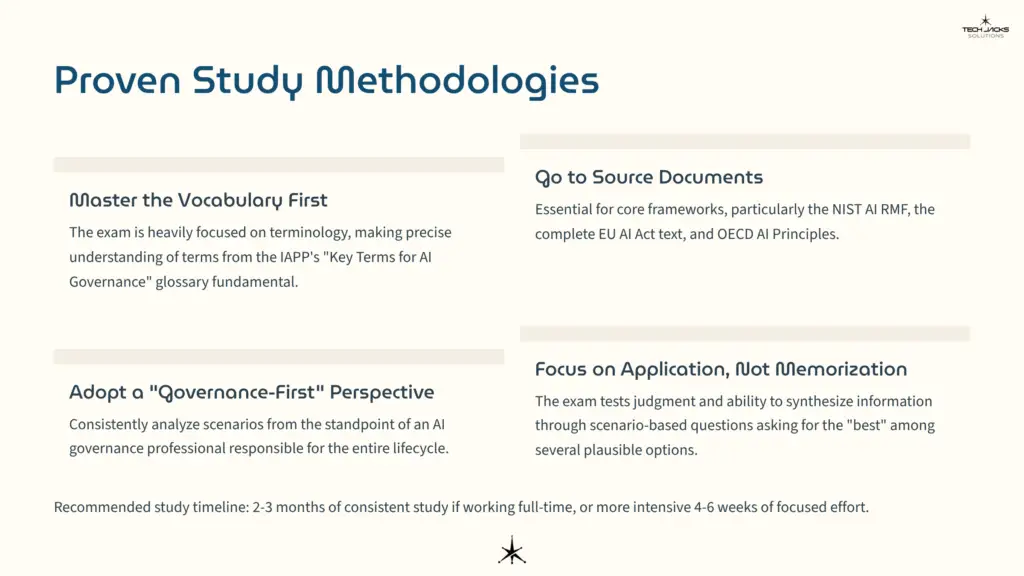
Cognitive Preparation Focus
The exam tests judgment and ability to synthesize information, not just rote memorization. The prevalence of scenario-based questions asking for the “best” among several plausible options means success depends on understanding nuances and trade-offs inherent in AI governance. Effective study approaches must focus on working through case studies and applying principles to practical problems.
Community Study Resources
User-generated flashcard decks are widely available and highly effective for mastering extensive terminology tested on the exam. Using variety of practice question banks from different providers helps develop deep understanding while avoiding simple memorization of answers.
The recommended study timeline varies based on individual background in law, technology, and risk management. A general guideline suggests planning for 2-3 months of consistent study if working full-time, or more intensive 4-6 weeks of focused effort.
Recent Updates and What’s Changed
The AIGP certification underwent significant curriculum revision in early 2025, reflecting the rapid maturation of the AI governance field and organizational shift from theoretical discussions to practical implementation needs.
Major Curriculum Restructuring
The original AIGP exam, effective through February 2, 2025, was structured around a broad, seven-domain Body of Knowledge designed to establish comprehensive foundational understanding. Effective February 3, 2025, the IAPP restructured the curriculum into a streamlined four-domain format.⁶
This evolution represents more than administrative change. It signals a strategic shift in focus, moving away from purely knowledge-based approaches and placing much heavier emphasis on practical, operational aspects of governing AI throughout its entire lifecycle. This reflects organizational needs as they move beyond theoretical discussions to actively managing AI systems in production environments.
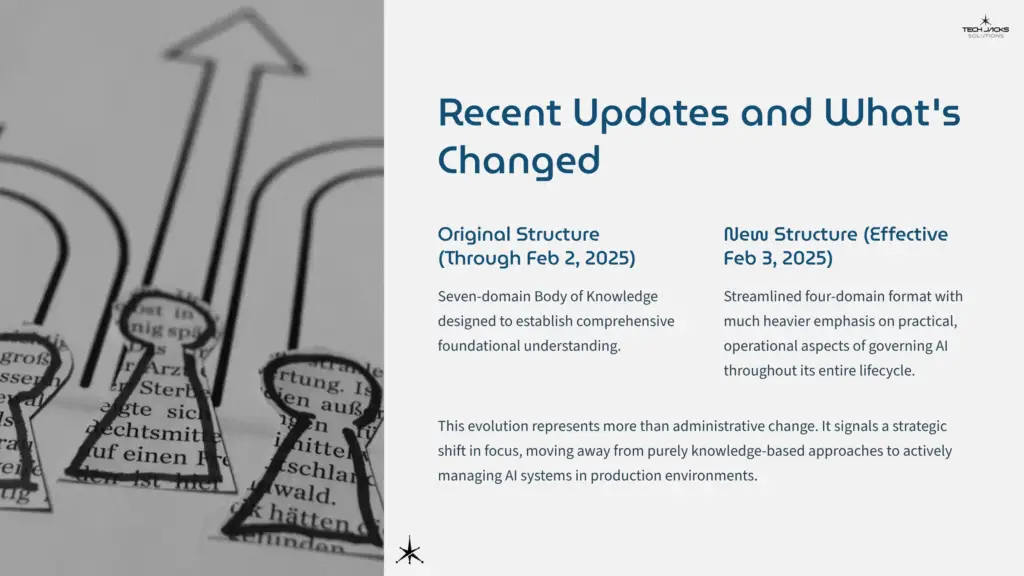
Domain Weight Redistribution
The weighting of the new domains is particularly revealing. Domains III and IV, focused on practical governance of AI development and deployment lifecycle, together account for 42 to 50 of the 85 scored questions. This means approximately 50-60% of the entire exam is dedicated to application of governance principles in operational contexts.⁶
The revision consolidates what were previously scattered practical elements across multiple domains into dedicated, heavily weighted operational domains. This requires candidates to move beyond memorization and develop ability to apply knowledge to complex, real-world scenarios.

Updated Emphasis Areas
The new structure emphasizes three critical areas reflecting current market needs. Regulatory compliance now focuses heavily on the “Framework Trinity”—EU AI Act, NIST AI Risk Management Framework, and ISO/IEC 42001 standard, representing legislative, risk management, and organizational management system pillars. Operational governance receives increased attention on post-deployment monitoring, incident response, and ongoing risk management. Cross-functional integration emphasizes the role of governance professionals as integrators between legal, technical, and business teams.
The changes position the certification to remain relevant as the field continues evolving from emerging discipline to established corporate function, reflecting the needs of organizations moving from AI experimentation to production deployment at scale.
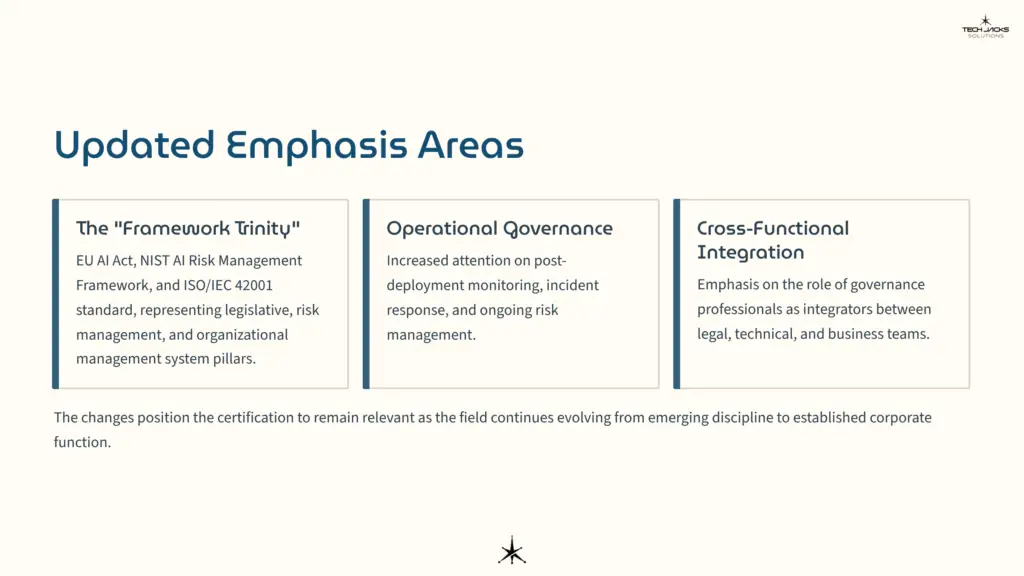
How AI is Transforming AI Governance Careers
The AI governance profession occupies a unique position within the broader AI transformation of work. It’s the field specifically created to manage AI’s responsible development and deployment, making it inherently resistant to AI displacement while simultaneously growing due to AI proliferation.
Current AI Integration in Governance Practice
AI governance professionals increasingly use AI tools to enhance their own effectiveness. Automated bias detection tools help identify problematic patterns in training datasets. AI-powered contract analysis assists with vendor due diligence for AI procurement. Natural language processing tools help monitor regulatory updates across multiple jurisdictions. Machine learning algorithms support ongoing model performance monitoring and drift detection.
These applications represent augmentation rather than replacement. AI tools help governance professionals scale their oversight capabilities, but judgment calls about risk tolerance, ethical trade-offs, and regulatory interpretation remain distinctly human responsibilities.

Human-Exclusive Governance Responsibilities
Core governance responsibilities require human judgment that can’t be automated. Ethical decision-making about AI deployment in sensitive contexts requires moral reasoning and stakeholder consideration. Regulatory interpretation and application to novel scenarios demands legal expertise and contextual understanding. Cross-functional communication and consensus-building around governance policies relies on emotional intelligence and organizational dynamics knowledge.
Risk assessment for novel AI-specific risks like adversarial attacks, model drift, and bias amplification requires professional expertise that combines technical understanding with business judgment. Incident response and stakeholder communication during AI governance failures requires human leadership and accountability.

Emerging Skill Requirements
The field is developing new competency requirements that blend traditional governance skills with AI-specific knowledge. Technical literacy without programming expertise means understanding how AI systems work well enough to govern them effectively. Regulatory agility involves staying current with rapidly evolving legal landscapes across multiple jurisdictions. Risk assessment capabilities must address novel AI-specific risks that traditional frameworks don’t fully capture.
Five-Year Professional Outlook
Demand for compliance-focused roles is expected to surge by 2025-2026 as the first wave of major AI regulations comes into full force. The first significant regulatory penalties will drive organizational urgency around governance capabilities, creating premium demand for verifiably competent professionals.¹⁵
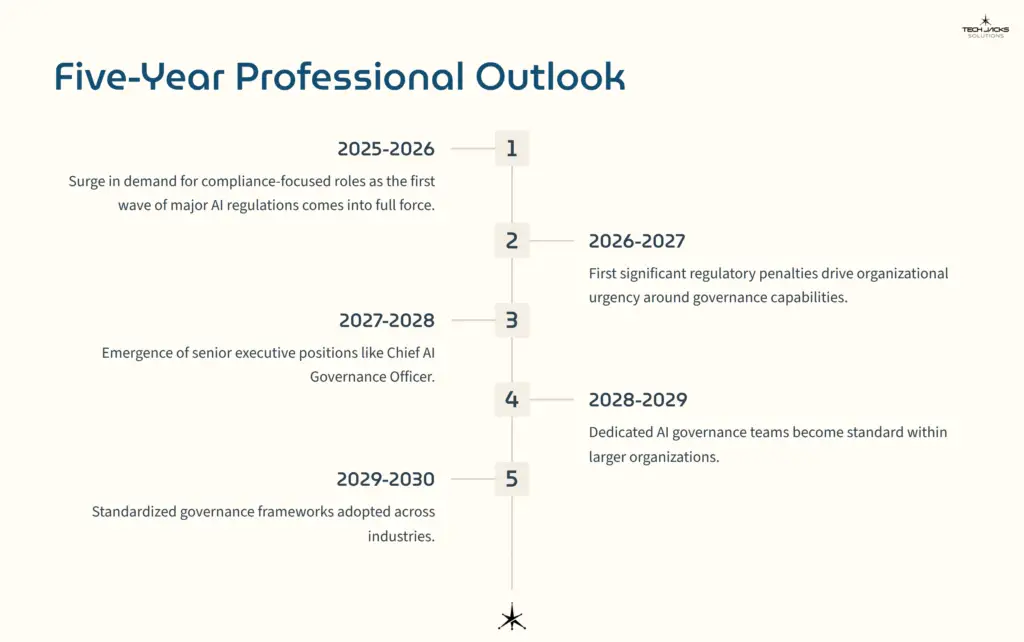
Career Advancement Strategies
Successful AI governance professionals will combine deep governance expertise with broad organizational influence. Building cross-functional relationships with legal, technical, and business teams becomes critical as AI governance requires enterprise-wide coordination. Staying current with regulatory developments across multiple jurisdictions, developing expertise in specific industry applications of AI governance, and maintaining technical literacy to effectively oversee increasingly sophisticated AI systems will differentiate top performers.
The profession offers significant job security because governance, oversight, and ethical management of AI systems inherently requires human judgment and accountability. Professionals with expertise to manage and oversee AI systems are becoming indispensable organizational assets.
Is AIGP Worth It in 2025?
Absolutely. The convergence of regulatory pressure, organizational need, and market demand creates compelling value for the AIGP certification that will only strengthen over time.
Market Timing and Competitive Advantage
The certification launches at the optimal moment in the AI governance maturity curve. Organizations have moved beyond “should we use AI?” to “how do we use AI responsibly?” Global regulations are transitioning from proposal to enforcement, creating compliance obligations requiring specialized expertise. The talent pool remains small while demand continues accelerating, creating significant premium opportunities for early adopters.
As the first globally recognized, vendor-neutral certification specifically designed for AI governance from an established credentialing body, the AIGP is exceptionally well-positioned to become the definitive industry standard.³ The market currently faces significant shortage of qualified talent, unlikely to close in the near term, creating powerful first-mover advantages for early certification holders.
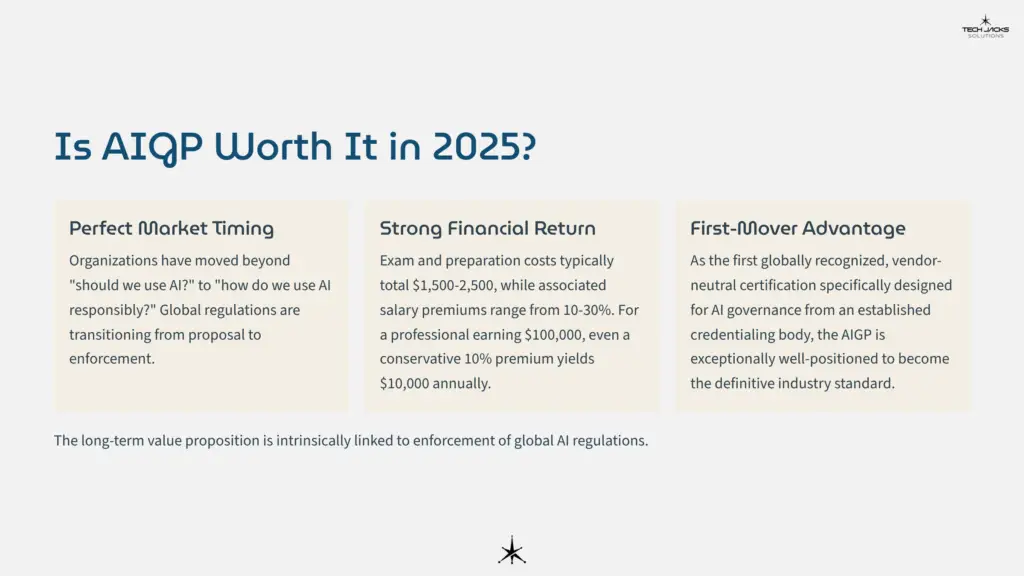
Financial Return Analysis
The certification’s cost structure provides strong return on investment. Exam and preparation costs typically total $1,500-2,500, while associated salary premiums range from 10-30% depending on experience level and industry. For a professional earning $100,000, even a conservative 10% premium yields $10,000 annually, recovering costs within the first year.
The long-term value proposition is intrinsically linked to enforcement of global AI regulations. While current demand is fueled by proactive risk management, the evolution from “preferred” to “required” will accelerate dramatically once regulatory bodies begin levying significant fines for AI governance failures. The GDPR’s impact on demand for CIPP/E certified professionals serves as direct historical precedent.³
Risk Assessment and Durability
The primary risk involves rapid regulatory changes that could shift required competencies. However, the AIGP’s foundation in established frameworks like NIST RMF and focus on principles-based governance provides durability against specific regulatory changes. The certification maintenance requirements ensure ongoing relevance through continuing education.⁷
Optimal Value Scenarios
The certification offers maximum value for privacy and compliance professionals seeking to expand into AI governance, technology professionals needing governance expertise for career advancement, legal professionals working with technology clients, risk management professionals addressing novel AI risks, and new graduates entering a field where traditional experience requirements don’t yet exist.
The certification offers less immediate value for senior executives already in established AI governance roles and purely technical professionals with no interest in governance responsibilities. However, even technical professionals benefit from understanding governance frameworks that affect their work.
Getting Started: Your Next Steps
Ready to pursue AIGP certification? Here’s your practical action plan for success.
Step 1: Assess Your Current Knowledge Foundation
Evaluate your existing expertise in three key areas. First, do you understand basic AI concepts like machine learning, training data, and algorithmic bias? Second, are you familiar with data privacy principles, particularly GDPR fundamentals and privacy-by-design concepts? Third, do you have experience with governance or risk management frameworks in any professional context? This assessment determines your study timeline and resource requirements.
Step 2: Choose Your Preparation Approach
Based on your background assessment, select appropriate study resources. Start with the free AIGP Body of Knowledge and Exam Blueprint from the IAPP website to understand the scope and structure.³ If you’re completely new to AI governance, plan for comprehensive preparation using both official IAPP materials and supplementary resources. If you have strong privacy or compliance background, you might succeed with official materials supplemented by practice exams and community resources.
Step 3: Create Your Realistic Study Plan
Develop a timeline based on your schedule and learning preferences. Full-time professionals typically need 2-3 months of consistent study, while intensive preparation can be completed in 4-6 weeks of focused effort. Allocate time across the four domains based on exam weighting: spend most time on Domains III and IV (practical governance applications), moderate time on Domain II (laws and frameworks), and foundational time on Domain I (governance principles).
Step 4: Build Comprehensive AI Literacy
Don’t just memorize frameworks—develop genuine understanding of how AI systems function in practice. Stay current with AI governance news and regulatory developments. Join professional communities for peer support and insights. Consider attending IAPP webinars and events for networking and continuing education opportunities.
Step 5: Schedule and Take Your Exam
Once you’ve completed preparation and consistently scored well on practice exams, register through the IAPP website and schedule with Pearson VUE.⁸ Choose between testing center and online proctoring based on your comfort level and technical setup. Plan for the optional 15-minute break but remember the clock doesn’t stop.
Step 6: Plan Your Career Development Strategy
Start networking within the AI governance community before taking the exam. Update your professional profiles to reflect AI governance interests and preparation. Begin identifying target roles and organizations that value AI governance expertise. Consider how the certification fits into your broader career development strategy and potential future certifications.
Step 7: Maintain Long-term Professional Relevance
The certification requires 20 hours of Continuing Privacy Education (CPE) credits every two years plus a $250 maintenance fee (waived for IAPP members).⁷ Plan for ongoing learning beyond minimum requirements. Stay current with regulatory developments, develop sector-specific expertise, and consider pursuing complementary certifications as your career progresses.
The field evolves rapidly, so commit to continuous learning and professional development to maintain competitive advantage in this growing profession.

Conclusion & Resources
The AIGP certification represents your entry point into a profession that will shape how society manages one of the most transformative technologies in human history. Organizations worldwide are discovering that AI governance isn’t optional—it’s legally mandated, operationally critical, and competitively essential.
The professionals who can bridge legal, technical, and business perspectives to ensure responsible AI deployment will define the future of this technology. Early adopters will benefit from first-mover advantages as demand intensifies and regulatory enforcement accelerates.
Ready to start? Visit the official IAPP AIGP page to download the Body of Knowledge and register for the exam.³
Reference Resource List
¹ IAPP Launches New AI Governance Professional Certification
⁶ AIGP Body of Knowledge and Exam Blueprint
¹⁰ ZipRecruiter AI Governance Salary Analysis
¹¹ PwC 2025 Global AI Jobs Barometer
¹⁴ Key Terms for AI Governance
¹⁵ AI Governance Profession Report

